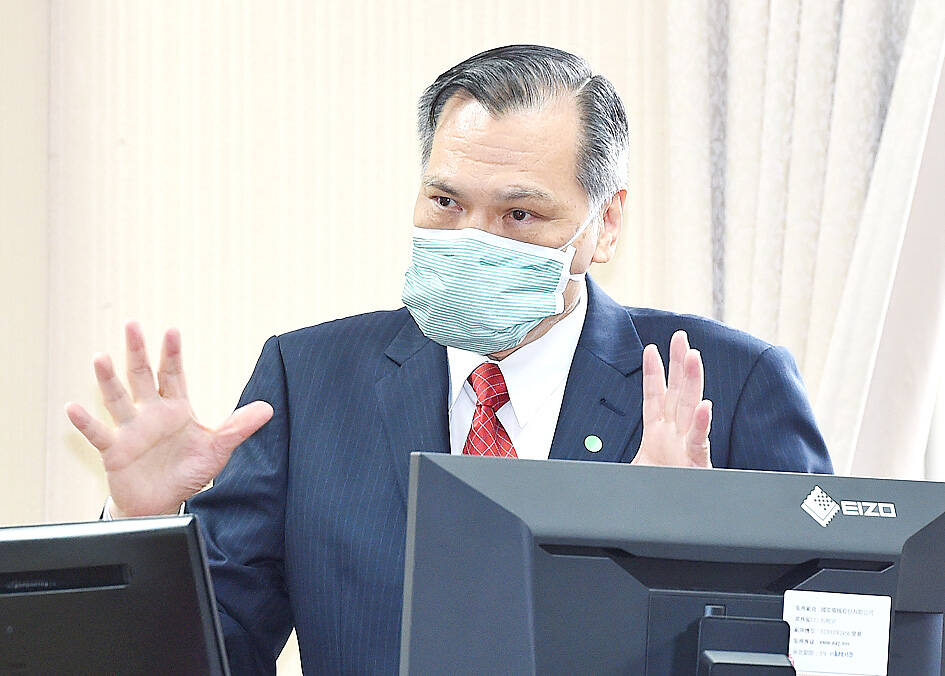An online rumor that National Security Bureau Director-General Chen Ming-tong (陳明通) visited Thailand at taxpayers’ expense in July is “classic cognitive warfare” intended to signal to foreign officials that their whereabouts in Thailand are known to China, a national security official said on Saturday.
The rumor originated from a Twitter message posted on Monday last week by the account “somchai” (@andreny45652235), claiming that Chen took a sightseeing trip to Thailand at public expense.
As proof, the user posted a photograph of Chen allegedly taken at Thai customs, as well as screenshots of a customs clearance spreadsheet and a hotel bill.

Photo: Liao Chen-huei, Taipei Times
The post was also shared on Facebook, including the popular group Baoliao Commune.
The bureau the same day said details of the post were incorrect, although it did not specify whether Chen visited Thailand.
“The activities of bureau officials as a matter of course are not shared with the public,” it said.
The Twitter account was created only last month and posted six messages before being taken down, a national security official said on condition of anonymity.
The incident played out as “classic cognitive warfare from overseas,” they said.
The account posted unverified photographs designed to instigate public debate and urged viewers to “see for yourself,” the official said.
The post was then shared on different social media platforms by collaborators and rewritten into news stories, ensuring that the false narrative makes the switch from online to offline to expand its sphere of influence, they said.
If true, it reveals the extent to which Chinese agents have infiltrated security systems in Thailand, they said, adding that the post intentionally includes information from multiple sources to convey its reach.
Apart from attempting to cast doubt on the abilities of Taiwan’s national security apparatus, the post also intends to send a message to officials from other countries that China might be aware of the details of their trips to Thailand, the official said.
As for the purpose of Chen’s alleged visit, the official said that Thailand has always been an important international center for intelligence.
Distrust of Beijing has deepened among other countries in the region over the past few months, and consequently boosting security ties and cooperation has become an urgent matter, they added.
Additional reporting by Aaron Tu

Intelligence agents have recorded 510,000 instances of “controversial information” being spread online by the Chinese Communist Party (CCP) so far this year, the National Security Bureau (NSB) said in a report yesterday, as it warned of artificial intelligence (AI) being employed to generate destabilizing misinformation. The bureau submitted a written report to the Legislative Yuan in preparation for National Security Bureau Director-General Tsai Ming-yen’s (蔡明彥) appearance before the Foreign Affairs and National Defense Committee today. The CCP has been using cognitive warfare to divide Taiwanese society by commenting on controversial issues such as Taiwan Semiconductor Manufacturing Co’s (TSMC, 台積電) investments in the

INVESTIGATION: The case is the latest instance of a DPP figure being implicated in an espionage network accused of allegedly leaking information to Chinese intelligence Democratic Progressive Party (DPP) member Ho Jen-chieh (何仁傑) was detained and held incommunicado yesterday on suspicion of spying for China during his tenure as assistant to then-minister of foreign affairs Joseph Wu (吳釗燮). The Taipei District Prosecutors’ Office said Ho was implicated during its investigation into alleged spying activities by former Presidential Office consultant Wu Shang-yu (吳尚雨). Prosecutors said there is reason to believe Ho breached the National Security Act (國家安全法) by leaking classified Ministry of Foreign Affairs information to Chinese intelligence. Following interrogation, prosecutors petitioned the Taipei District Court to detain Ho, citing concerns over potential collusion or tampering of evidence. The

‘COMPREHENSIVE PLAN’: Lin Chia-lung said that the government was ready to talk about a variety of issues, including investment in and purchases from the US The National Stabilization Fund (NSF) yesterday announced that it would step in to staunch stock market losses for the ninth time in the nation’s history. An NSF board meeting, originally scheduled for Monday next week, was moved to yesterday after stocks plummeted in the wake of US President Donald Trump’s announcement of 32 percent tariffs on Taiwan on Wednesday last week. Board members voted to support the stock market with the NT$500 billion (US$15.15 billion) fund, with injections of funds to begin as soon as today. The NSF in 2000 injected NT$120 billion to stabilize stocks, the most ever. The lowest amount it

NEGOTIATIONS: Taiwan has good relations with Washington and the outlook for the negotiations looks promising, Minister of Economic Affairs J.W. Kuo said Taiwan’s GDP growth this year is expected to decrease by 0.43 to 1.61 percentage points due to the effects of US tariffs, National Development Council (NDC) Minister Paul Liu (劉鏡清) said at a meeting of the legislature’s Economics Committee in Taipei yesterday, citing a preliminary estimate by a private research institution. Taiwan’s economy would be significantly affected by the 32 percent “reciprocal” tariffs slapped by the US, which took effect yesterday, Liu said, adding that GDP growth could fall below 3 percent and potentially even dip below 2 percent to 1.53 percent this year. The council has commissioned another institution